SOC203 Living Sociology: Sociological Theory Analysis of Fake News
VerifiedAdded on 2022/10/13
|6
|1351
|11
Essay
AI Summary
This essay compares and contrasts two articles concerning Singapore's approach to fake news, using the concept of sociological imagination. It discusses the Singaporean government's initiatives to combat online falsehoods and the concerns surrounding potential infringements on civil liberties. The analysis considers Marxist perspectives on state control of the internet and emphasizes the importance of individual mindset and environmental factors in shaping perceptions of fake news. The essay also proposes a research approach using questionnaires to gather data on public opinion regarding anti-fake news laws, highlighting the value of understanding both intrinsic beliefs and societal influences in addressing the issue of misinformation.
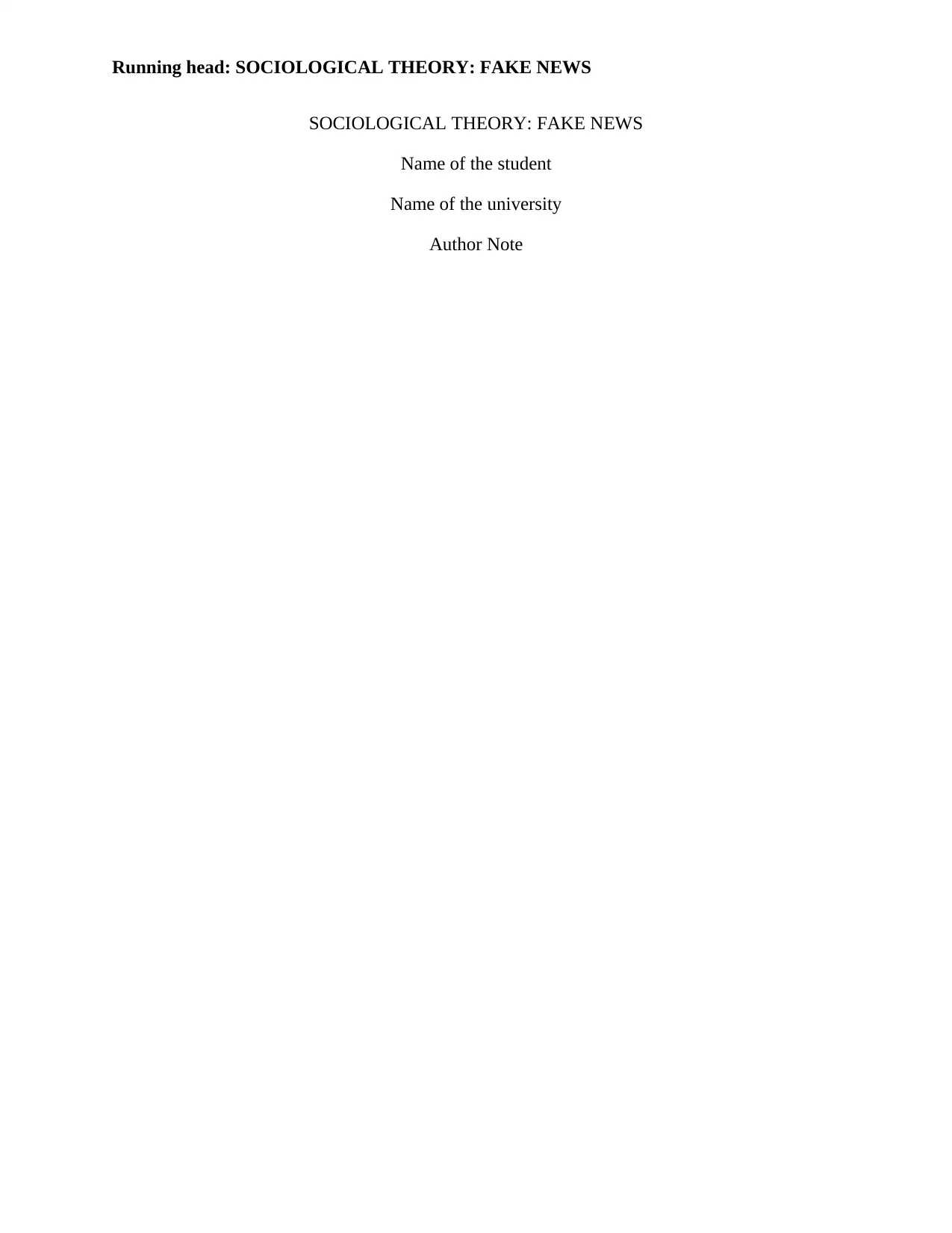
Running head: SOCIOLOGICAL THEORY: FAKE NEWS
SOCIOLOGICAL THEORY: FAKE NEWS
Name of the student
Name of the university
Author Note
SOCIOLOGICAL THEORY: FAKE NEWS
Name of the student
Name of the university
Author Note
Paraphrase This Document
Need a fresh take? Get an instant paraphrase of this document with our AI Paraphraser
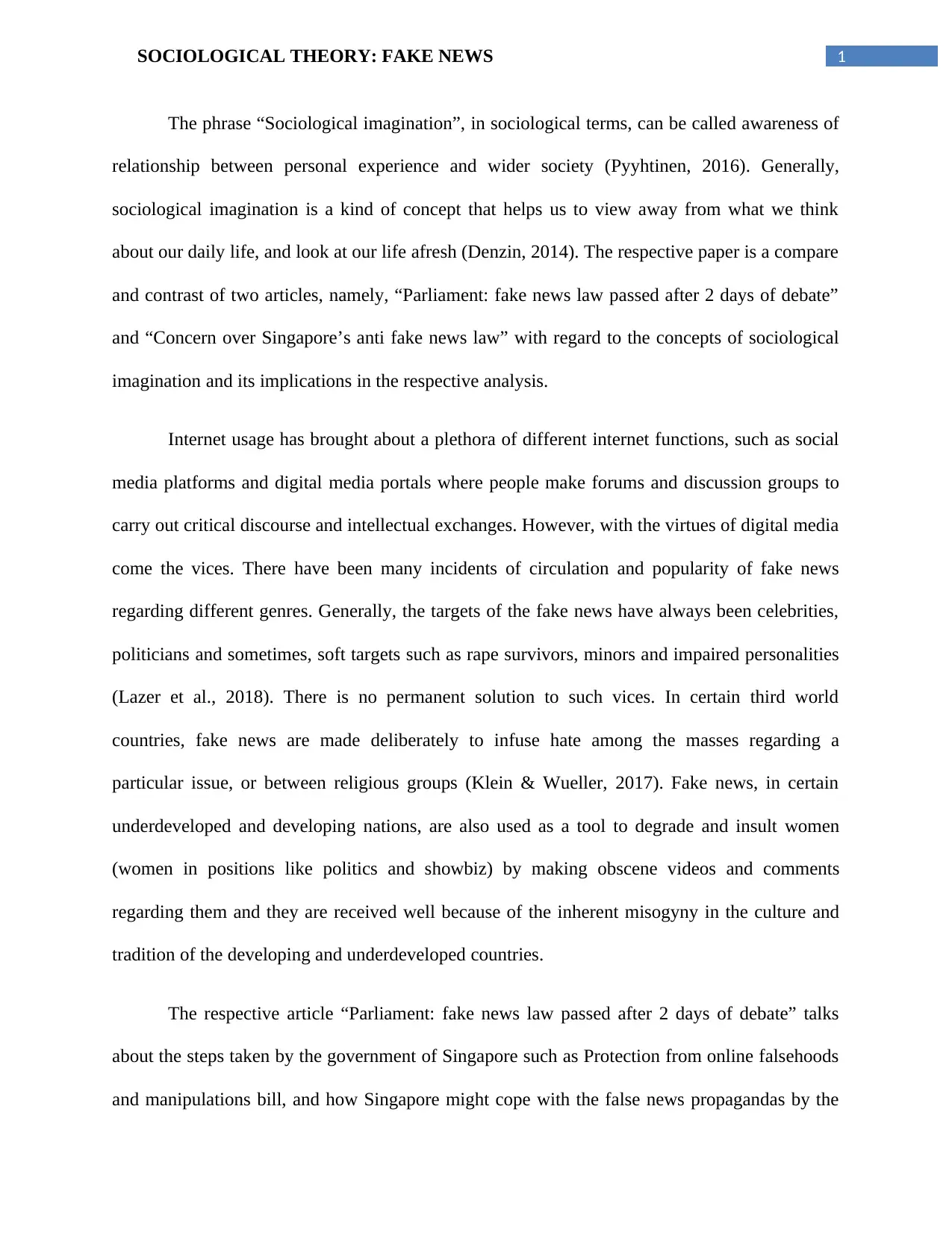
1SOCIOLOGICAL THEORY: FAKE NEWS
The phrase “Sociological imagination”, in sociological terms, can be called awareness of
relationship between personal experience and wider society (Pyyhtinen, 2016). Generally,
sociological imagination is a kind of concept that helps us to view away from what we think
about our daily life, and look at our life afresh (Denzin, 2014). The respective paper is a compare
and contrast of two articles, namely, “Parliament: fake news law passed after 2 days of debate”
and “Concern over Singapore’s anti fake news law” with regard to the concepts of sociological
imagination and its implications in the respective analysis.
Internet usage has brought about a plethora of different internet functions, such as social
media platforms and digital media portals where people make forums and discussion groups to
carry out critical discourse and intellectual exchanges. However, with the virtues of digital media
come the vices. There have been many incidents of circulation and popularity of fake news
regarding different genres. Generally, the targets of the fake news have always been celebrities,
politicians and sometimes, soft targets such as rape survivors, minors and impaired personalities
(Lazer et al., 2018). There is no permanent solution to such vices. In certain third world
countries, fake news are made deliberately to infuse hate among the masses regarding a
particular issue, or between religious groups (Klein & Wueller, 2017). Fake news, in certain
underdeveloped and developing nations, are also used as a tool to degrade and insult women
(women in positions like politics and showbiz) by making obscene videos and comments
regarding them and they are received well because of the inherent misogyny in the culture and
tradition of the developing and underdeveloped countries.
The respective article “Parliament: fake news law passed after 2 days of debate” talks
about the steps taken by the government of Singapore such as Protection from online falsehoods
and manipulations bill, and how Singapore might cope with the false news propagandas by the
The phrase “Sociological imagination”, in sociological terms, can be called awareness of
relationship between personal experience and wider society (Pyyhtinen, 2016). Generally,
sociological imagination is a kind of concept that helps us to view away from what we think
about our daily life, and look at our life afresh (Denzin, 2014). The respective paper is a compare
and contrast of two articles, namely, “Parliament: fake news law passed after 2 days of debate”
and “Concern over Singapore’s anti fake news law” with regard to the concepts of sociological
imagination and its implications in the respective analysis.
Internet usage has brought about a plethora of different internet functions, such as social
media platforms and digital media portals where people make forums and discussion groups to
carry out critical discourse and intellectual exchanges. However, with the virtues of digital media
come the vices. There have been many incidents of circulation and popularity of fake news
regarding different genres. Generally, the targets of the fake news have always been celebrities,
politicians and sometimes, soft targets such as rape survivors, minors and impaired personalities
(Lazer et al., 2018). There is no permanent solution to such vices. In certain third world
countries, fake news are made deliberately to infuse hate among the masses regarding a
particular issue, or between religious groups (Klein & Wueller, 2017). Fake news, in certain
underdeveloped and developing nations, are also used as a tool to degrade and insult women
(women in positions like politics and showbiz) by making obscene videos and comments
regarding them and they are received well because of the inherent misogyny in the culture and
tradition of the developing and underdeveloped countries.
The respective article “Parliament: fake news law passed after 2 days of debate” talks
about the steps taken by the government of Singapore such as Protection from online falsehoods
and manipulations bill, and how Singapore might cope with the false news propagandas by the
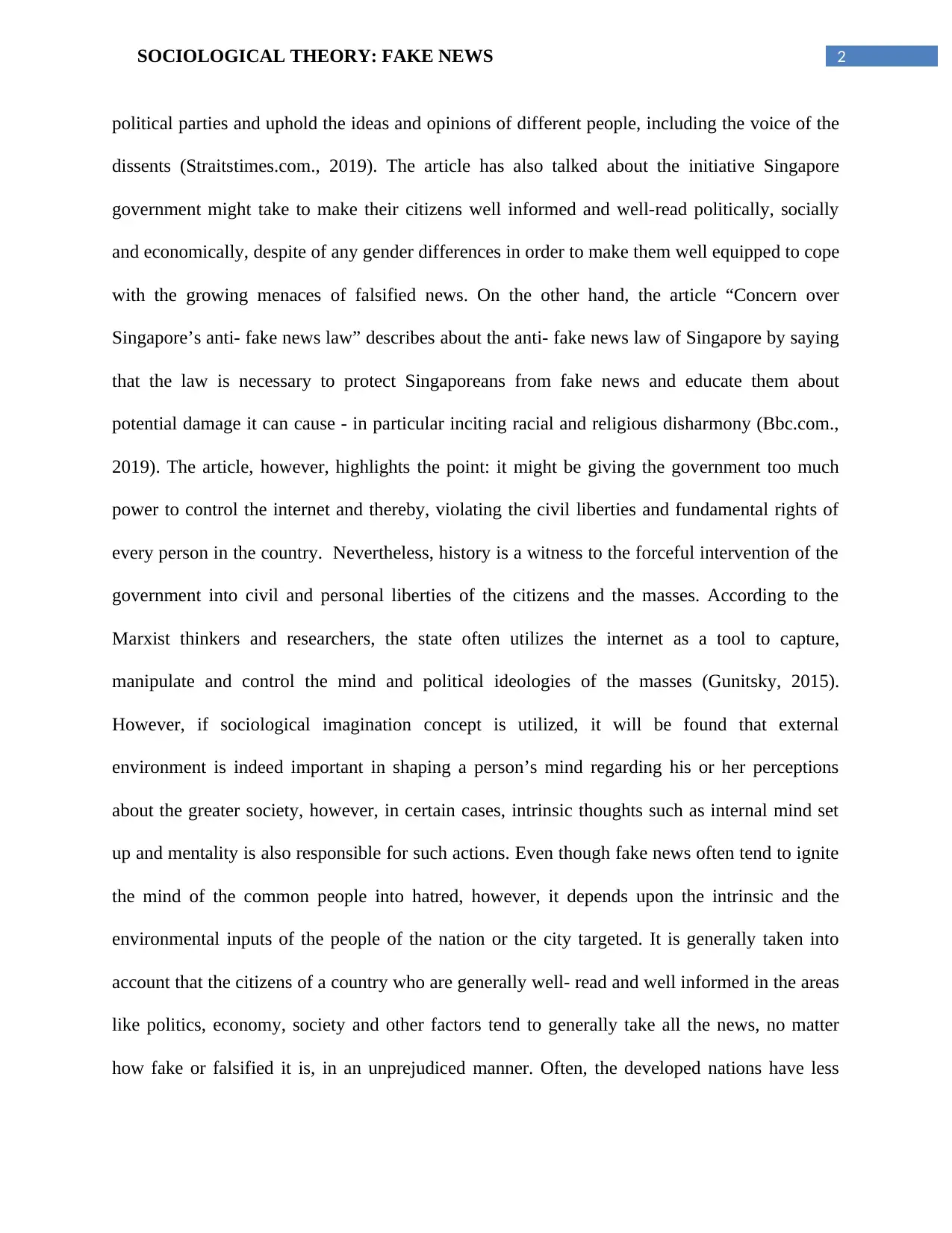
2SOCIOLOGICAL THEORY: FAKE NEWS
political parties and uphold the ideas and opinions of different people, including the voice of the
dissents (Straitstimes.com., 2019). The article has also talked about the initiative Singapore
government might take to make their citizens well informed and well-read politically, socially
and economically, despite of any gender differences in order to make them well equipped to cope
with the growing menaces of falsified news. On the other hand, the article “Concern over
Singapore’s anti- fake news law” describes about the anti- fake news law of Singapore by saying
that the law is necessary to protect Singaporeans from fake news and educate them about
potential damage it can cause - in particular inciting racial and religious disharmony (Bbc.com.,
2019). The article, however, highlights the point: it might be giving the government too much
power to control the internet and thereby, violating the civil liberties and fundamental rights of
every person in the country. Nevertheless, history is a witness to the forceful intervention of the
government into civil and personal liberties of the citizens and the masses. According to the
Marxist thinkers and researchers, the state often utilizes the internet as a tool to capture,
manipulate and control the mind and political ideologies of the masses (Gunitsky, 2015).
However, if sociological imagination concept is utilized, it will be found that external
environment is indeed important in shaping a person’s mind regarding his or her perceptions
about the greater society, however, in certain cases, intrinsic thoughts such as internal mind set
up and mentality is also responsible for such actions. Even though fake news often tend to ignite
the mind of the common people into hatred, however, it depends upon the intrinsic and the
environmental inputs of the people of the nation or the city targeted. It is generally taken into
account that the citizens of a country who are generally well- read and well informed in the areas
like politics, economy, society and other factors tend to generally take all the news, no matter
how fake or falsified it is, in an unprejudiced manner. Often, the developed nations have less
political parties and uphold the ideas and opinions of different people, including the voice of the
dissents (Straitstimes.com., 2019). The article has also talked about the initiative Singapore
government might take to make their citizens well informed and well-read politically, socially
and economically, despite of any gender differences in order to make them well equipped to cope
with the growing menaces of falsified news. On the other hand, the article “Concern over
Singapore’s anti- fake news law” describes about the anti- fake news law of Singapore by saying
that the law is necessary to protect Singaporeans from fake news and educate them about
potential damage it can cause - in particular inciting racial and religious disharmony (Bbc.com.,
2019). The article, however, highlights the point: it might be giving the government too much
power to control the internet and thereby, violating the civil liberties and fundamental rights of
every person in the country. Nevertheless, history is a witness to the forceful intervention of the
government into civil and personal liberties of the citizens and the masses. According to the
Marxist thinkers and researchers, the state often utilizes the internet as a tool to capture,
manipulate and control the mind and political ideologies of the masses (Gunitsky, 2015).
However, if sociological imagination concept is utilized, it will be found that external
environment is indeed important in shaping a person’s mind regarding his or her perceptions
about the greater society, however, in certain cases, intrinsic thoughts such as internal mind set
up and mentality is also responsible for such actions. Even though fake news often tend to ignite
the mind of the common people into hatred, however, it depends upon the intrinsic and the
environmental inputs of the people of the nation or the city targeted. It is generally taken into
account that the citizens of a country who are generally well- read and well informed in the areas
like politics, economy, society and other factors tend to generally take all the news, no matter
how fake or falsified it is, in an unprejudiced manner. Often, the developed nations have less
⊘ This is a preview!⊘
Do you want full access?
Subscribe today to unlock all pages.

Trusted by 1+ million students worldwide
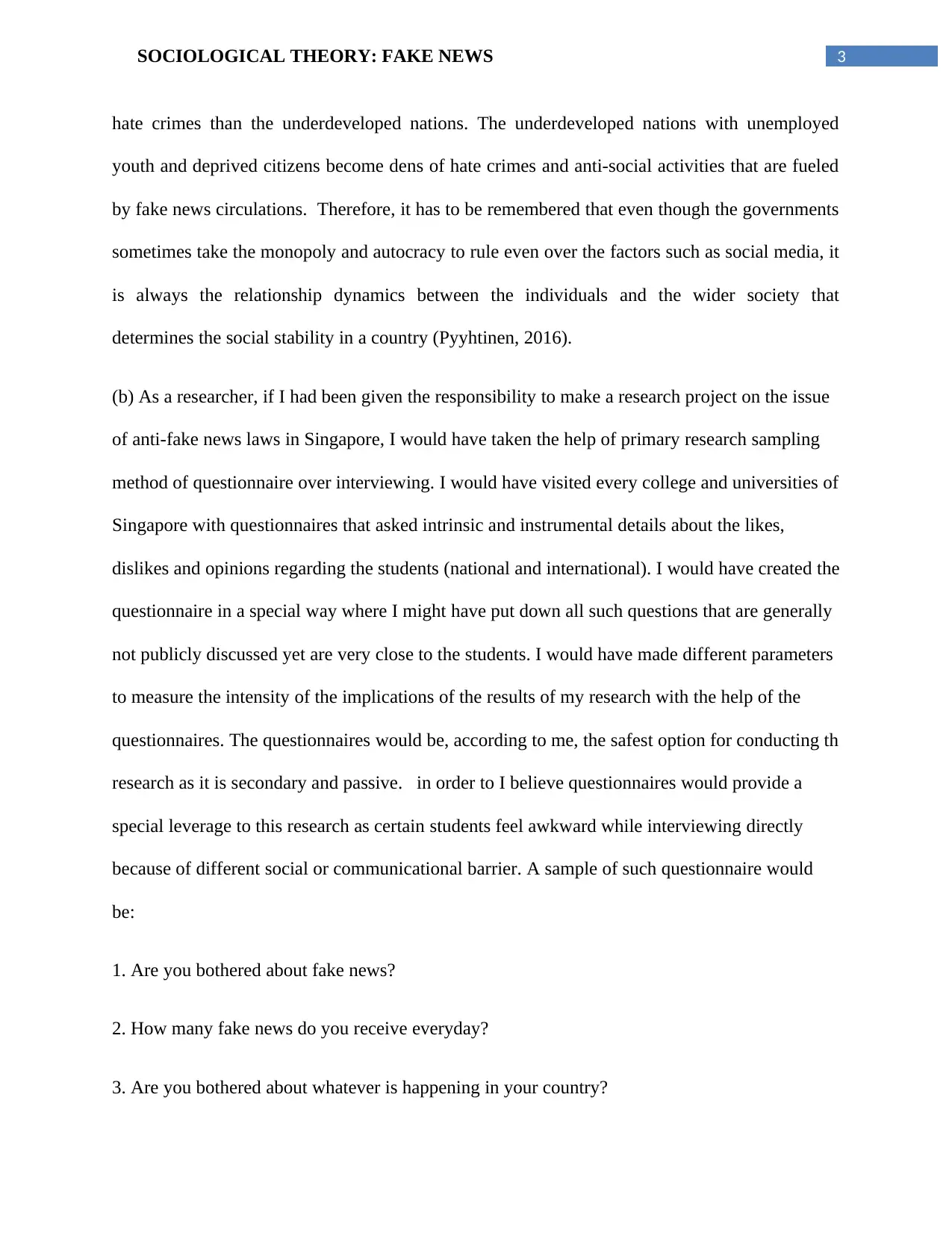
3SOCIOLOGICAL THEORY: FAKE NEWS
hate crimes than the underdeveloped nations. The underdeveloped nations with unemployed
youth and deprived citizens become dens of hate crimes and anti-social activities that are fueled
by fake news circulations. Therefore, it has to be remembered that even though the governments
sometimes take the monopoly and autocracy to rule even over the factors such as social media, it
is always the relationship dynamics between the individuals and the wider society that
determines the social stability in a country (Pyyhtinen, 2016).
(b) As a researcher, if I had been given the responsibility to make a research project on the issue
of anti-fake news laws in Singapore, I would have taken the help of primary research sampling
method of questionnaire over interviewing. I would have visited every college and universities of
Singapore with questionnaires that asked intrinsic and instrumental details about the likes,
dislikes and opinions regarding the students (national and international). I would have created the
questionnaire in a special way where I might have put down all such questions that are generally
not publicly discussed yet are very close to the students. I would have made different parameters
to measure the intensity of the implications of the results of my research with the help of the
questionnaires. The questionnaires would be, according to me, the safest option for conducting th
research as it is secondary and passive. in order to I believe questionnaires would provide a
special leverage to this research as certain students feel awkward while interviewing directly
because of different social or communicational barrier. A sample of such questionnaire would
be:
1. Are you bothered about fake news?
2. How many fake news do you receive everyday?
3. Are you bothered about whatever is happening in your country?
hate crimes than the underdeveloped nations. The underdeveloped nations with unemployed
youth and deprived citizens become dens of hate crimes and anti-social activities that are fueled
by fake news circulations. Therefore, it has to be remembered that even though the governments
sometimes take the monopoly and autocracy to rule even over the factors such as social media, it
is always the relationship dynamics between the individuals and the wider society that
determines the social stability in a country (Pyyhtinen, 2016).
(b) As a researcher, if I had been given the responsibility to make a research project on the issue
of anti-fake news laws in Singapore, I would have taken the help of primary research sampling
method of questionnaire over interviewing. I would have visited every college and universities of
Singapore with questionnaires that asked intrinsic and instrumental details about the likes,
dislikes and opinions regarding the students (national and international). I would have created the
questionnaire in a special way where I might have put down all such questions that are generally
not publicly discussed yet are very close to the students. I would have made different parameters
to measure the intensity of the implications of the results of my research with the help of the
questionnaires. The questionnaires would be, according to me, the safest option for conducting th
research as it is secondary and passive. in order to I believe questionnaires would provide a
special leverage to this research as certain students feel awkward while interviewing directly
because of different social or communicational barrier. A sample of such questionnaire would
be:
1. Are you bothered about fake news?
2. How many fake news do you receive everyday?
3. Are you bothered about whatever is happening in your country?
Paraphrase This Document
Need a fresh take? Get an instant paraphrase of this document with our AI Paraphraser
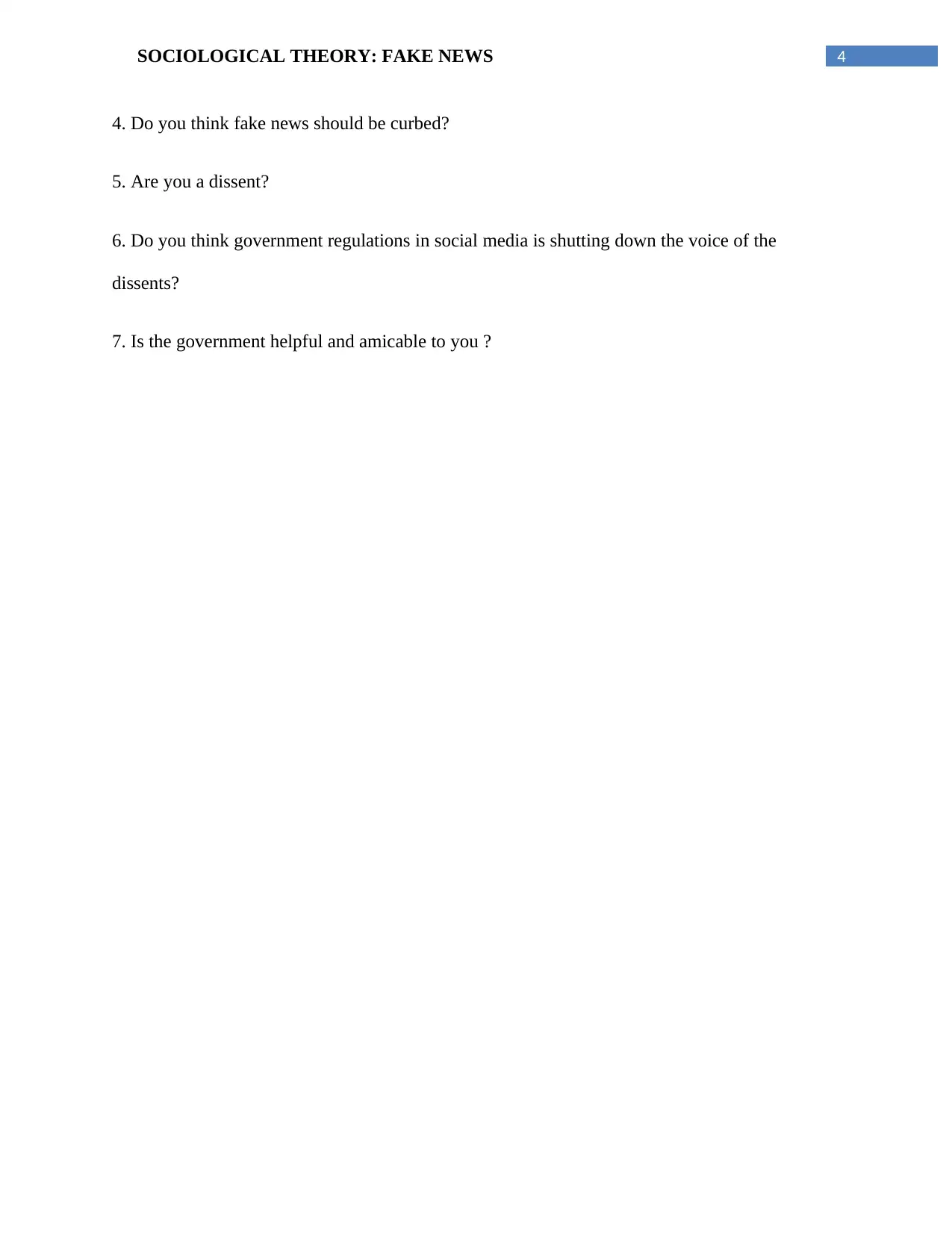
4SOCIOLOGICAL THEORY: FAKE NEWS
4. Do you think fake news should be curbed?
5. Are you a dissent?
6. Do you think government regulations in social media is shutting down the voice of the
dissents?
7. Is the government helpful and amicable to you ?
4. Do you think fake news should be curbed?
5. Are you a dissent?
6. Do you think government regulations in social media is shutting down the voice of the
dissents?
7. Is the government helpful and amicable to you ?
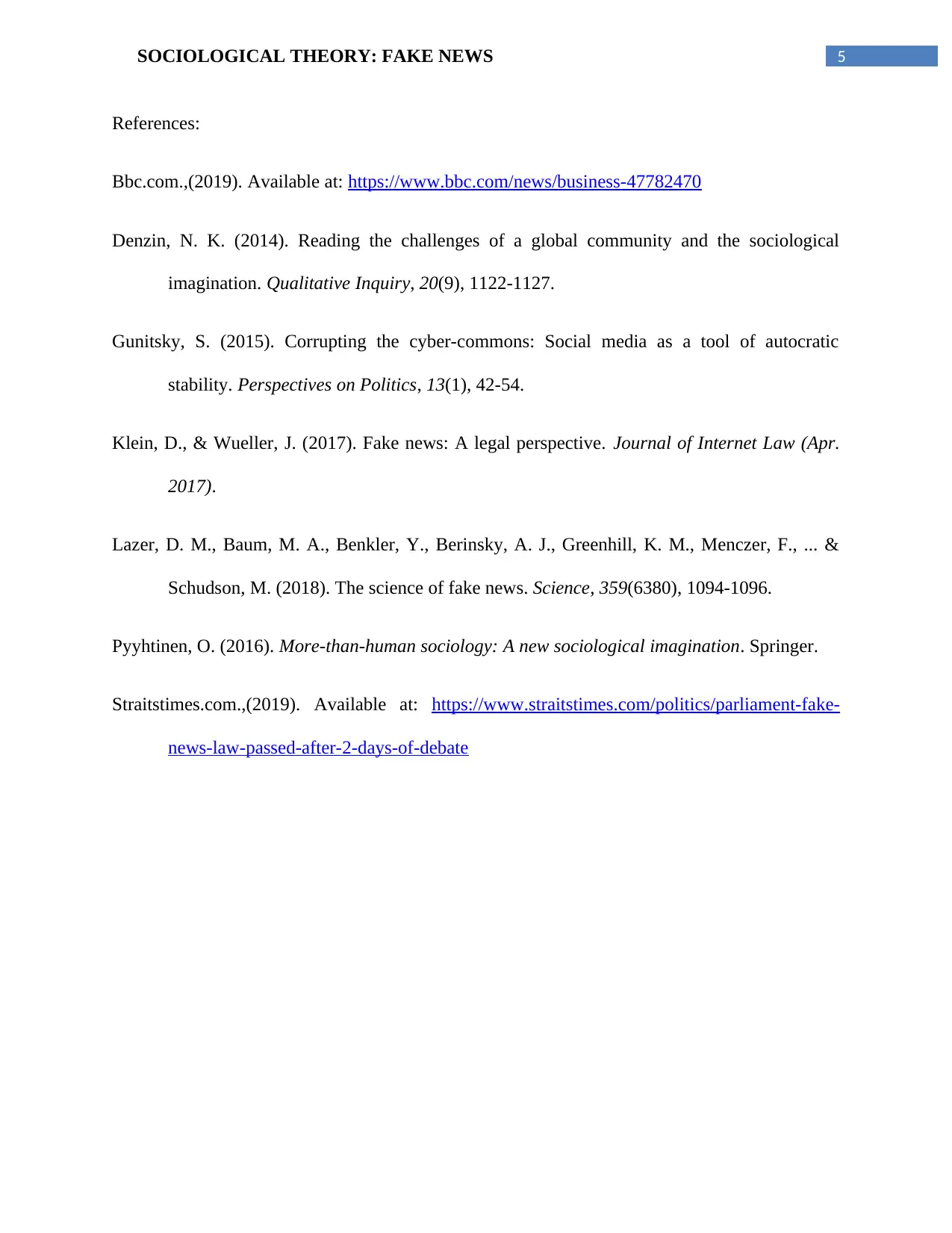
5SOCIOLOGICAL THEORY: FAKE NEWS
References:
Bbc.com.,(2019). Available at: https://www.bbc.com/news/business-47782470
Denzin, N. K. (2014). Reading the challenges of a global community and the sociological
imagination. Qualitative Inquiry, 20(9), 1122-1127.
Gunitsky, S. (2015). Corrupting the cyber-commons: Social media as a tool of autocratic
stability. Perspectives on Politics, 13(1), 42-54.
Klein, D., & Wueller, J. (2017). Fake news: A legal perspective. Journal of Internet Law (Apr.
2017).
Lazer, D. M., Baum, M. A., Benkler, Y., Berinsky, A. J., Greenhill, K. M., Menczer, F., ... &
Schudson, M. (2018). The science of fake news. Science, 359(6380), 1094-1096.
Pyyhtinen, O. (2016). More-than-human sociology: A new sociological imagination. Springer.
Straitstimes.com.,(2019). Available at: https://www.straitstimes.com/politics/parliament-fake-
news-law-passed-after-2-days-of-debate
References:
Bbc.com.,(2019). Available at: https://www.bbc.com/news/business-47782470
Denzin, N. K. (2014). Reading the challenges of a global community and the sociological
imagination. Qualitative Inquiry, 20(9), 1122-1127.
Gunitsky, S. (2015). Corrupting the cyber-commons: Social media as a tool of autocratic
stability. Perspectives on Politics, 13(1), 42-54.
Klein, D., & Wueller, J. (2017). Fake news: A legal perspective. Journal of Internet Law (Apr.
2017).
Lazer, D. M., Baum, M. A., Benkler, Y., Berinsky, A. J., Greenhill, K. M., Menczer, F., ... &
Schudson, M. (2018). The science of fake news. Science, 359(6380), 1094-1096.
Pyyhtinen, O. (2016). More-than-human sociology: A new sociological imagination. Springer.
Straitstimes.com.,(2019). Available at: https://www.straitstimes.com/politics/parliament-fake-
news-law-passed-after-2-days-of-debate
⊘ This is a preview!⊘
Do you want full access?
Subscribe today to unlock all pages.

Trusted by 1+ million students worldwide
1 out of 6
Your All-in-One AI-Powered Toolkit for Academic Success.
+13062052269
info@desklib.com
Available 24*7 on WhatsApp / Email
![[object Object]](/_next/static/media/star-bottom.7253800d.svg)
Unlock your academic potential
Copyright © 2020–2026 A2Z Services. All Rights Reserved. Developed and managed by ZUCOL.